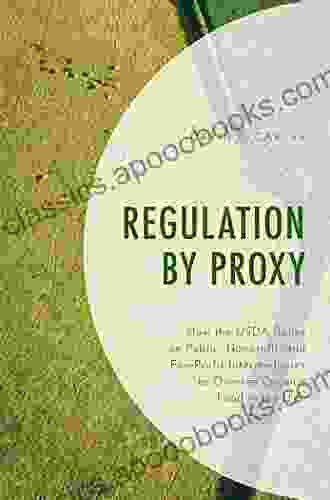How the USDA Relies on Public, Nonprofit, and For-Profit Intermediaries to Implement Farm Bill Programs

The United States Department of Agriculture (USDA) relies on a network of public, nonprofit, and for-profit intermediaries to implement its farm bill programs. These intermediaries play a vital role in delivering USDA programs and services to farmers, ranchers, and other agricultural stakeholders.
5 out of 5
| Language | : | English |
| File size | : | 4049 KB |
| Text-to-Speech | : | Enabled |
| Screen Reader | : | Supported |
| Enhanced typesetting | : | Enabled |
| Word Wise | : | Enabled |
| Print length | : | 252 pages |
Types of Intermediaries
There are many different types of intermediaries that work with the USDA. These include:
- Public intermediaries are government agencies or institutions that receive funding from the USDA to implement farm bill programs.
- Nonprofit intermediaries are organizations that are not for profit and that receive funding from the USDA to implement farm bill programs.
- For-profit intermediaries are businesses that receive funding from the USDA to implement farm bill programs.
Roles of Intermediaries
Intermediaries play a variety of roles in implementing USDA farm bill programs. These roles include:
- Providing technical assistance to farmers and ranchers.
- Delivering educational programs to farmers and ranchers.
- Conducting research on agricultural issues.
- Providing financial assistance to farmers and ranchers.
- Advocating for farmers and ranchers.
Benefits of Using Intermediaries
There are many benefits to using intermediaries to implement USDA farm bill programs. These benefits include:
- Intermediaries can provide specialized expertise that the USDA does not have.
- Intermediaries can reach farmers and ranchers who are not being reached by the USDA.
- Intermediaries can provide a more cost-effective way to deliver USDA programs and services.
- Intermediaries can help to ensure that USDA programs and services are meeting the needs of farmers and ranchers.
Challenges of Using Intermediaries
There are also some challenges to using intermediaries to implement USDA farm bill programs. These challenges include:
- Intermediaries can be expensive.
- Intermediaries can be difficult to manage.
- Intermediaries can sometimes have their own agendas that may not align with the USDA's goals.
The USDA relies on a network of public, nonprofit, and for-profit intermediaries to implement its farm bill programs. These intermediaries play a vital role in delivering USDA programs and services to farmers, ranchers, and other agricultural stakeholders. There are many benefits to using intermediaries, but there are also some challenges. The USDA must carefully manage its relationships with intermediaries to ensure that they are meeting the needs of farmers and ranchers.
5 out of 5
| Language | : | English |
| File size | : | 4049 KB |
| Text-to-Speech | : | Enabled |
| Screen Reader | : | Supported |
| Enhanced typesetting | : | Enabled |
| Word Wise | : | Enabled |
| Print length | : | 252 pages |
Do you want to contribute by writing guest posts on this blog?
Please contact us and send us a resume of previous articles that you have written.
 Book
Book Novel
Novel Page
Page Chapter
Chapter Text
Text Story
Story Genre
Genre Reader
Reader Library
Library Paperback
Paperback E-book
E-book Magazine
Magazine Newspaper
Newspaper Paragraph
Paragraph Sentence
Sentence Bookmark
Bookmark Shelf
Shelf Glossary
Glossary Bibliography
Bibliography Foreword
Foreword Preface
Preface Synopsis
Synopsis Annotation
Annotation Footnote
Footnote Manuscript
Manuscript Scroll
Scroll Codex
Codex Tome
Tome Bestseller
Bestseller Classics
Classics Library card
Library card Narrative
Narrative Biography
Biography Autobiography
Autobiography Memoir
Memoir Reference
Reference Encyclopedia
Encyclopedia Cody Rose Clevidence
Cody Rose Clevidence Daniel Lucas
Daniel Lucas Andy Crouch
Andy Crouch Andries Louws
Andries Louws Eileen Kennedy Moore
Eileen Kennedy Moore Scott Newstok
Scott Newstok Susan L Haugland
Susan L Haugland Tom Holladay
Tom Holladay Andrei P Tsygankov
Andrei P Tsygankov Tammi Young
Tammi Young Andrew James
Andrew James Joyce Maynard
Joyce Maynard Andrew Faulkner
Andrew Faulkner Linda Winstead Jones
Linda Winstead Jones Peter Cawdron
Peter Cawdron Shirley Jackson
Shirley Jackson Geoffrey Blainey
Geoffrey Blainey Brian Shea
Brian Shea Andrea Lacy
Andrea Lacy Christine Jay
Christine Jay
Light bulbAdvertise smarter! Our strategic ad space ensures maximum exposure. Reserve your spot today!

 Ralph EllisonThe Complete American Constitutionalism, Volume Five, Part: Unlocking the...
Ralph EllisonThe Complete American Constitutionalism, Volume Five, Part: Unlocking the... Kenzaburō ŌeFollow ·19.9k
Kenzaburō ŌeFollow ·19.9k Joel MitchellFollow ·10.1k
Joel MitchellFollow ·10.1k Felix CarterFollow ·15.1k
Felix CarterFollow ·15.1k Donovan CarterFollow ·6.6k
Donovan CarterFollow ·6.6k Eugene ScottFollow ·13.7k
Eugene ScottFollow ·13.7k Forrest ReedFollow ·7.7k
Forrest ReedFollow ·7.7k Geoffrey BlairFollow ·13.3k
Geoffrey BlairFollow ·13.3k Devin CoxFollow ·18.6k
Devin CoxFollow ·18.6k

 Devin Ross
Devin RossUnlocking the Secrets of the Mind: Brain Mapping...
The human...

 Jacob Foster
Jacob FosterNovel of Misconception, Truth, and Love: A Journey of...
Unraveling the Lies We...

 Benji Powell
Benji PowellThe Only Technique You Will Ever Need: Unlocking the...
By [Author's...

 Pete Blair
Pete BlairUnveiling the Enchanting World of 'Magnolia House' by...
A Literary...
5 out of 5
| Language | : | English |
| File size | : | 4049 KB |
| Text-to-Speech | : | Enabled |
| Screen Reader | : | Supported |
| Enhanced typesetting | : | Enabled |
| Word Wise | : | Enabled |
| Print length | : | 252 pages |














